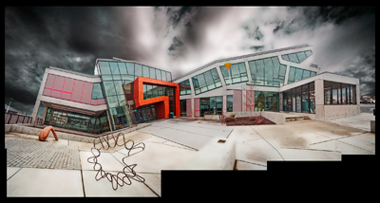Inside EvCC: Photography Instructor Lloyd Weller
40 years teaching at EvCC
Photography instructor Lloyd Weller speaks about 1969 at Everett Community College, internationally known artists who started here, and how digital photography has changed the industry, in this 2009 interview.
Lloyd Weller started teaching photography at Everett Community College in September 1969.
It was right after Woodstock and almost a decade into the Vietnam War. Student protesters and folk singers were a common sight on campus. Forty years later, the campus community is still colorful and interesting, Lloyd said.
Lloyd is part of the reason EvCC's photography program has been one of the strongest in the state for almost 60 years.
"We've really served students well for all of these years," he said. "This program is very well supported — stable, with strong administrative backing. Students receive a strong foundation in photography so they can go in whatever direction they want, and succeed."
The program was established in the 1950s. It's one of the few photography programs at a Washington community college with a broad, liberal-arts foundation. It was started with the foresight of Russell Day, one of this state's most recognized arts faculty.

Photo caption: Lloyd made "Artist's Muse," a composite of 15 individual photographs of Whitehorse Hall, to demonstrate for his class a feature of the Photoshop software.
Internationally known photographers such as pinhole photographer Craig Barber and fashion photographer Dale Windham got their start here, and world-famous photorealist and painter Chuck Close also started at Everett Junior College's art department.
Today, students can prepare for transfer to a university, study for personal interest, go on to commercial or portrait work or pursue a Bachelor of Fine Arts at the university level.
A Student First and Forever
Originally from West Seattle, Lloyd took his first college photography classes at Everett Junior College in 1964 from Allen Carter. At Carter's insistence, he soon transferred to Ohio University, the oldest degree-granting photography program at a major university in the country, where Lloyd and previous EvCC photography faculty earned their Bachelor's and Master's degrees.
He worked as an industrial advertising photographer for John Deere, travelling the country chasing tractors. Missing the college environment, however, he jumped at an offer to teach at EvCC.
"When I was in grad school, I didn't want to leave. I could have been a student all my life," he said.
He has taught everything from optics and color theory to studio photography, workshops, the history of photography, videography, and audio production. He still teaches 8 to 9 subjects a year.
"Lloyd Weller is an administrator's dream," said Jeanne Leader, Dean of Arts and Learning Resources. "He is a thoughtful, hard working faculty member who questions but is always collaborative, truly enjoys the real work of teaching every day and consistently steps forward to contribute his expertise to both the photography program and the college as a whole.
Digital photography came on the scene in the early 1990s, and Lloyd — and the photography program — were ready for it. In the late 1960s his university professor had predicted the rise of a new form of photography.
"He said film photography was limited and there would be an electronic form that would take over," Lloyd said. "Within 10 years the first digital camera came on the scene." That was 1976.
By the 1990s, digital cameras, Photoshop and printing were getting better. The industry exploded in the late 1990s. In 1995, Lloyd took a two-quarter sabbatical to learn all he could about the new medium.
"By then I had let go of film, and I haven't turned around since," he said.
The college's program also shifted away from film completely. Although students can work with film for special projects, Lloyd and Ellen Felsenthal, his colleague in the program, teach only digital, a far superior teaching tool, he says, because it's more affordable and students master technique much faster.
"What's so exciting about today is there really are no boundaries between the media – music, cinema, photography, graphic arts, studio arts," he said. "I've always believed in eliminating boundaries."
In his own work, Lloyd tends toward pictures that are subjective, such as a composite image of the Everett sky and a desert scene blended seamlessly together. He enjoys manipulating images into something unexpected.
"I like viewers to question the subject," he said. "It forces them to engage, to come up with an interpretation that's unique to them. As a teacher, it's really important for students to develop their own style and their own interpretations."
Lloyd also works in video production and has created and collaborated on several oral history projects, including "A Special Place: Clark Park," the story of Everett's first city park, which his wife Elle Ray wrote and directed.
"Lloyd is a great listener, excellent instructor, and role model for us all as a true lifelong learner," Jeanne said.
Retirement?
Today, Lloyd is the longest-serving employee of Everett Community College. Since 1969, EvCC has grown and changed, but it's still the same college.
"I wasn't expecting to stay this long, but the faculty was so strong and interesting I just simply couldn't leave," Lloyd said in 2009. "It has gone by very quickly, and it doesn't seem like 40 years."
With students clamoring to get into the renowned photography program, the department has added sections in every area. And classes are full.
"I still can't imagine retiring," he said.

